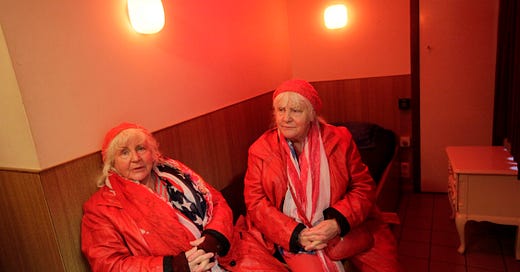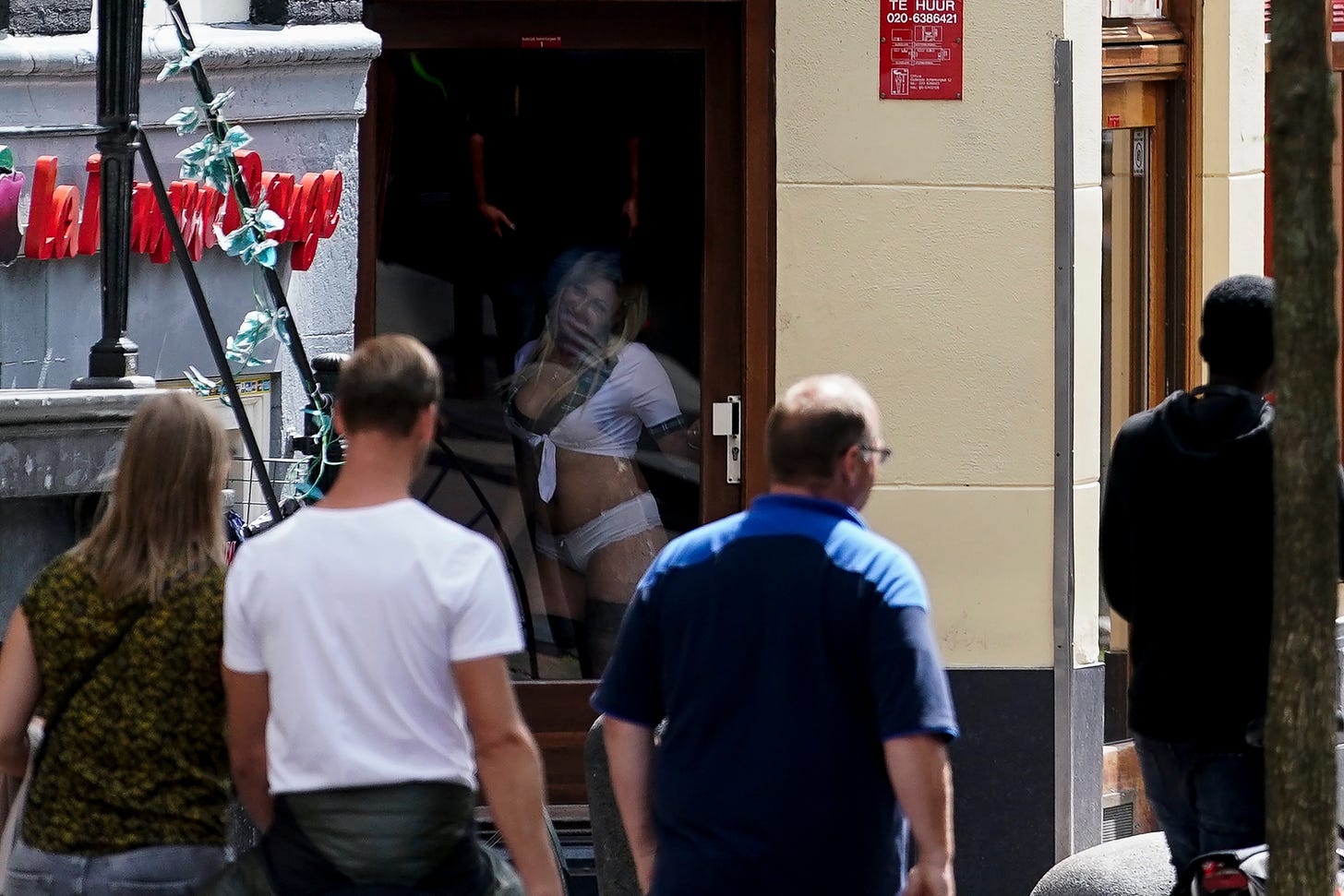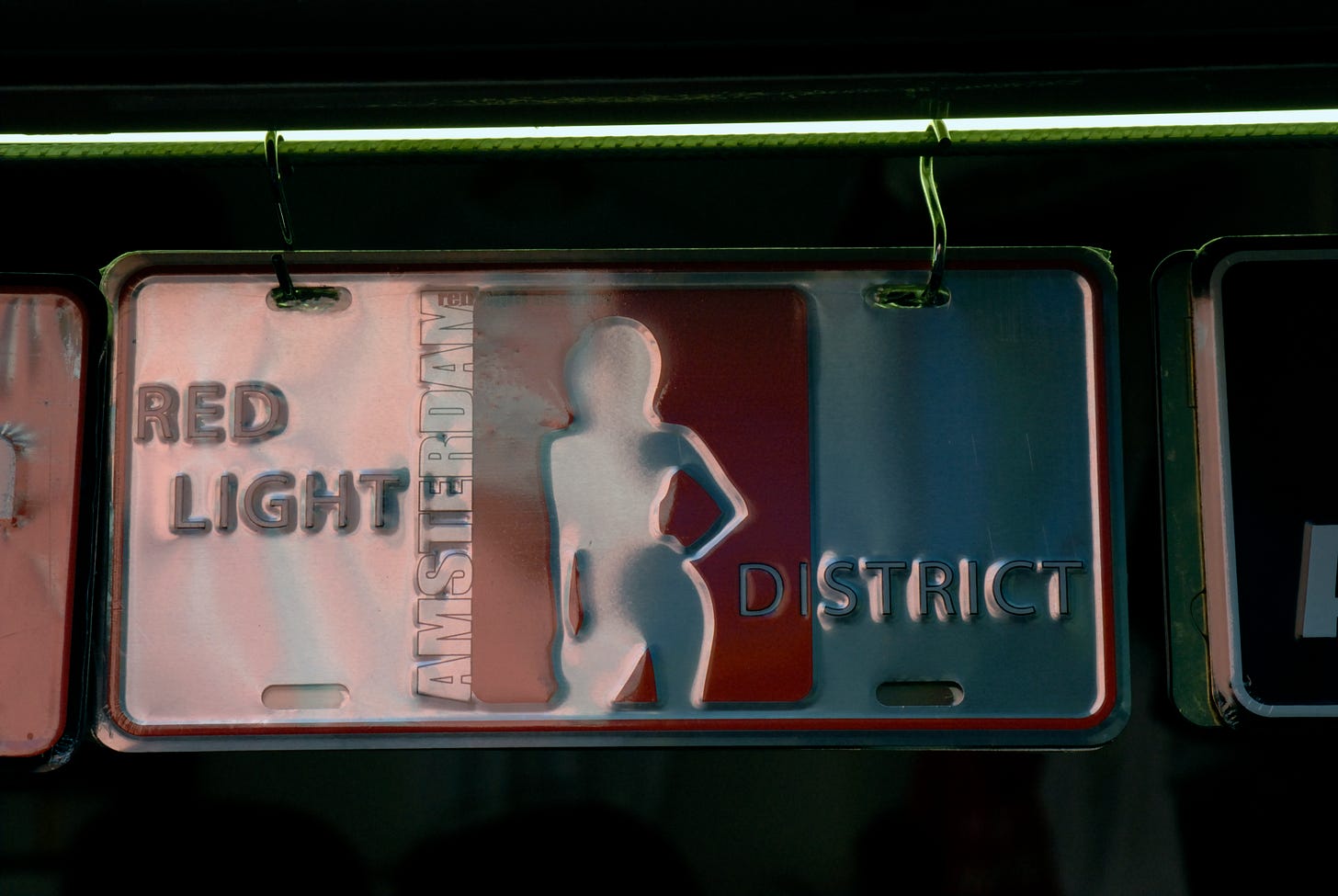Meet the Fokkens
In 2012 I travelled to Amsterdam, where brothel prostitution was legalised in 2000, to interview identical twins, Louise and Martine Fokkens, promoted as 'the oldest window girls in Holland'.
I decided to return to this story to see how the women are doing, and have made contact with them recently. They are now 83 years old. Neither Louise or Martine made any money from the incredibly successful film about their lives, made in 2012. I plan on taking a trip to visit the twins very soon.
The article below was first published on 17 Sep 2012
Born to Jewish parents in war-torn Holland, the twins hid from the Nazis in their family’s Amsterdam basement while others, such as the Franks, were rounded up and sent to concentration camps
Neither Louise nor Martine Fokkens fit the stereotype of a window prostitute in Amsterdam. The majority of women working in the most notorious public brothel scene in Europe are young, conventionally attractive and, in the main, from outside of Holland. The Fokkens are 70-year-old identical twins, and very Dutch.
Known as the ‘oldest window girls’ in Amsterdam, Louise and Martine have almost 100 years experience of prostitution between them. They have been the subject of a well-received film aptly named ‘Meet the Fokkens’ and have written a book about their lives due to be released later this month.
I travel to meet the twins and to be given a guided tour around the legalised sex industry that attracts thousands of British sex tourists every year.
The sisters dress and speak identically, and, to make matters more complicated, usually talk in unison, over each other, in a way that makes it almost impossible to make sense of. They have their own stories, and way of telling them, which is almost in code. But they are warm, tactile and eager to please.
“I was beaten on to the streets by my husband in my early 20s,” Louise tells me when we meet in a tapas bar on Warmoesstraat, in the heart of the red light area, “He told me unless I earned money for him he would leave me, and I had children and loved him, so I had to do it.”
I can tell Martine apart from Louise as she is wearing a scarf of a US flag, but then Louise pulls one out and drapes it around her shoulders, telling me how desperate they both are to visit America. “We made friends with the Yankee boys during the war, and they gave us chewing gum and chocolate. Since we were children we have dreamed about going to America.”
Louise has three children, and some or all have been in and out of foster care. It is difficult to get the exact story of whom and when because Martine, who has four children, interjects with tales of losing her own offspring and the heartache that ensued. It could be that one tells the story for both, or they tell each others. But both have encountered violence, abuse and exploitation, and their early years in prostitution were hard. “We kept each other company,” says Louise, “But Martine needs to carry on because there is not much money around.”
Louise, who left prostitution two years ago due to arthritis (“I could not do sexual positions,”) tells me how things have changed for the worse since she entered the sex trade. “There are few Dutch women and no sense of community these days,” she says. “There is no point working just for tax. That is why the girls are working from the Internet and from home,” interjects Martine. “You are less likely to be spotted by the taxman. The whole family used to live off your earnings and now the tax office comes up with crazy amounts you have to pay.”
When Louise began prostituting Martine was in hospital having her first child. “My mother came in and said, “You know Louise is [in prostitution]. I was in shock. I hated the way she was talked about and I wanted to help her.”
“Later on they needed a cleaner in the brothel and Martine took the job and the men asked her for business,” says Louise, “So we started doing threesomes, and that was how we ended up working in the same house (window brothel) together.”
The relatively rosy picture the twins paint of prostitution is perhaps because they have always looked out after each other and, unlike the vast majority of other women, even saw punters together. Did Louise find the work easier with Martine by her side?
“Oh yes,” they say in unison. “We are always together. We do everything together.”
The sisters live on the outskirts of Amsterdam and Martine still commutes into the city three days a week. I ask how busy she is. “Yes, yes, so-so,” she says. “My regulars want to know they will get a good service.”
Would they recommend prostitution to young women as a good way to earn money?
“Yes,” they say in unison. “But they have to do it properly. Some girls only take ten minutes though. That’s not what he came for. You have to take your time with a man.”
Again I hear of the ‘good old days’ when there was camaraderie between the women and the customers were all jolly and gentle. Martine tells me that since the government legalised brothel prostitution in 2000 things are no longer the same.
“Legalisation has never worked. It has always been a problem,” says Martine. “It is better for the pimps and the foreigners, but not the Dutch girls. The vultures came in 2000. Organised criminals. They thought, ahah, it is legalised now we are OK.”
It is almost impossible to get a sense of whether the twins regret their lives in prostitution, so masked by the joie de vie attitude both have adopted. The only time they both stop laughing and teasing each other is when Louise tells me about the shame she brought on her family when caught soliciting on the streets at the beginning.
“Our mother drove down to the canal where we were working on the street and shouted from across the road, “I see you! Your father is coming.” She hit me. I was very embarrassed for my parents.”
Born into an ordinary middle class family with seven children in total, the twins enjoyed a happy childhood . But it all changed when Louise married a violent and controlling man.
I ask if she saved during her working years. “I have 5 Euros in my purse,” she says, “Whores are expected to do things for nothing.” Unsure of what she meant, I asked why the sisters do not charge a few Euros for posing for photographs with the endless stream of men who approach them. “No says Louise. That would not be right.”
The sisters obviously relish their fame, and glow with pride when recognised by the public. I have a sense that the women are viewed as celebrity oddities, and that the men will show the photos around for a laugh, although with prostitution being so public and normalised in Amsterdam it is hard to tell.
Today the red light district is undergoing gentrification. Many politicians and citizens are waking up to the fact that legalisation has failed to reduce trafficking, pimping and drug abuse. Figures for all three are high in Amsterdam, having risen significantly since 2000. The first window where the sisters worked is now an haute couture tailors, with naked manikins replacing women in the window.
I am led down tiny alleyways and pass windows filled with women in bikinis. It is midday. Groups of hungover sex tourists are window-shopping. The women look detached and bored, and most appear to be from Eastern Europe and Africa.
Louise says she knows that trafficking exits but seems more to resent the competition it poses to the Dutch women than anything else. “You can walk away,” she says. “There are so many authorities checking up on you these days, and you can tell your client and he will tell the police.” Louise was not able to walk away when she was pimped by her husband, but she does not make the connection.
In front of the Oude Kerk (Old Church) on Oudekerksplein we come to a bronze statue in honour of “sex workers around the world”, titled Belle. The sisters are asked by a group of labourers to pose with them by it. They point across the canal to a café and tell me it is where the pimps used to gather. I ask if there is a lot of violence in prostitution. “It happens but they [customers] are usually drunk. In the old days the girls used to come. If you needed a pimp to look after you they were never there so you needed the girls to do it.”
Martine says she has no retirement date in mind, and Louise interjects with, “She has no money to retire yet.” On our way back to the restaurant the twins are stopped again by a group of men asking them to pose for a photograph. The image captured on camera however, of two happy old women seemingly without a care in the world, belies the truth of the abuse, hardship and social exclusion endured throughout two extraordinary lifetimes.








Disturbing! A trans widow I profiled, a Dane, said her crossdressing, violent boyfriend pimped her out to other crossdressing men. She was so afraid of him that when she finally got out, she went into hiding for a time. She's been too frightened of his connections to organized crime (and now we have a "musical" about it!) that she never reported the assaults, rapes and death threats. In carefree Denmark. Talk about lost lives. Thanks for telling us the awful truth, Julie.
Of course the mother didn't attack the husband who prostituted Louise.